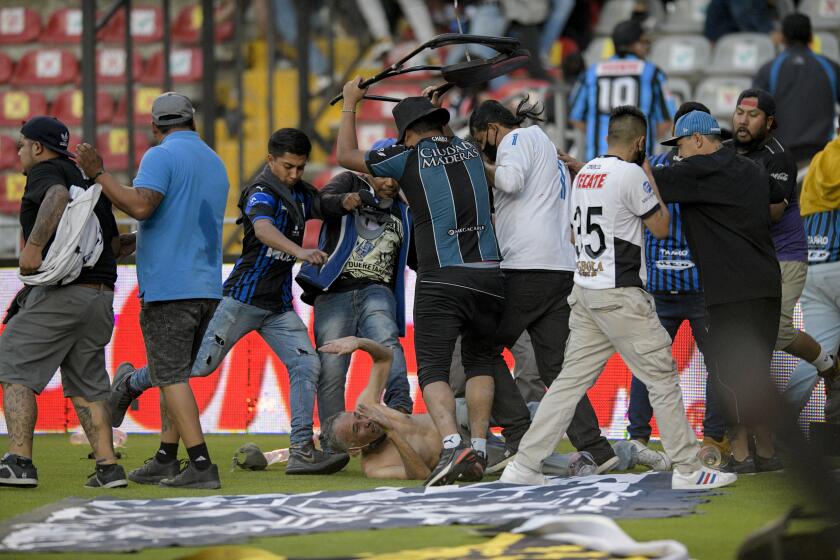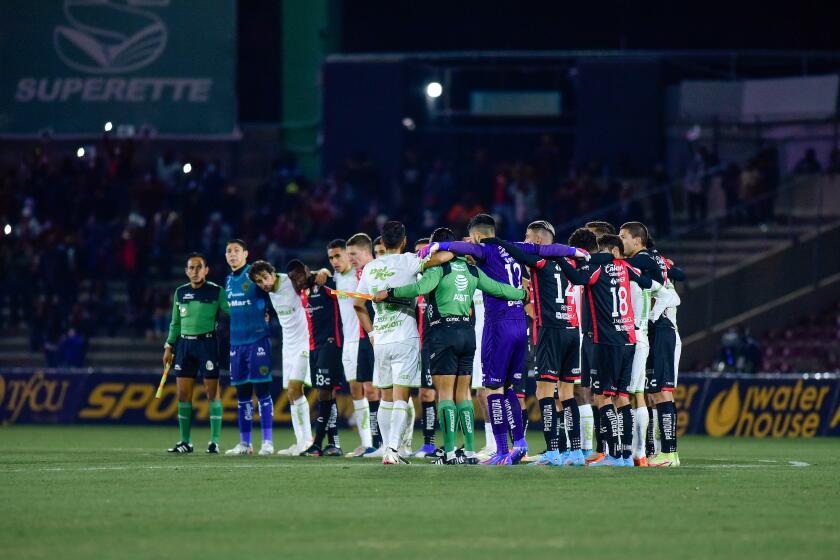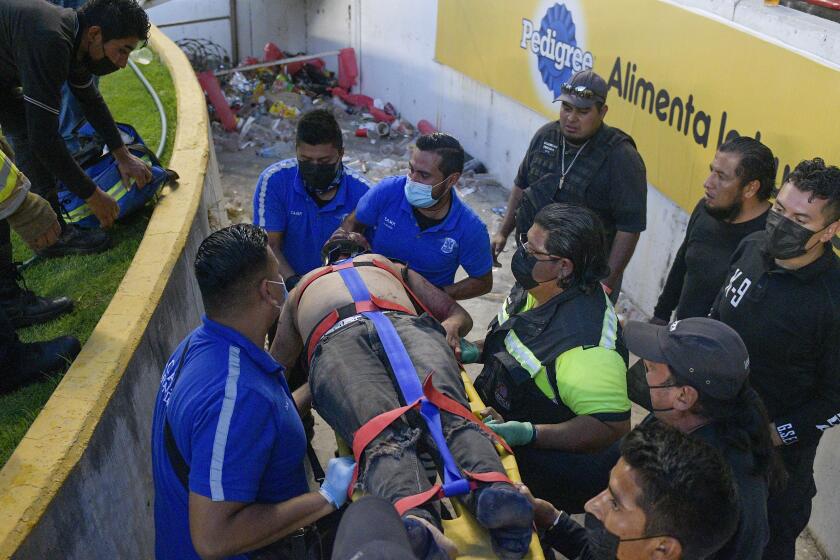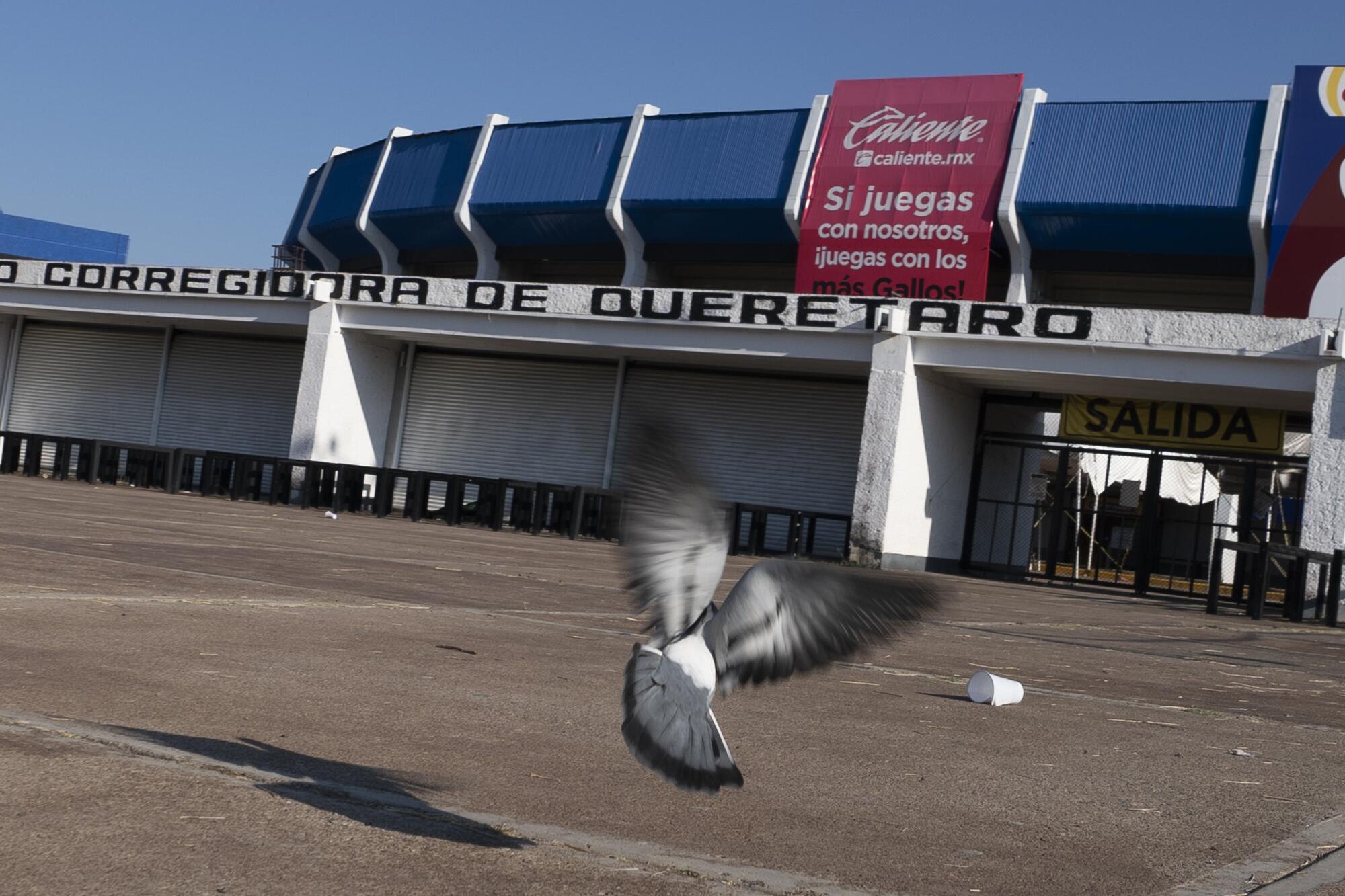
- Share via
SANTIAGO DE QUERETARO, Mexico — Estadio Corregidora sat dark and silent, the glow from half a dozen security lights the only thing softening the night sky blanketing its 34,000 empty seats.
La Corregidora becomes a city unto itself when Querétaro’s soccer team plays at home, with thousands of noisy vendors and fans filling the squat oval stadium and the unpaved parking lots that surround it. It was supposed to be that way Thursday when Los Gallos Blancos, as the team is known, were scheduled to play host to San Luis in a crucial match with playoff implications for both.
Instead, the game was played behind closed doors a 2½-hour drive away in Morelia, a result of sanctions leveled against Querétaro FC after the team’s last home match two weeks ago ended in a bloody riot that left 26 people hospitalized.
The last of the riot victims was discharged just hours before Thursday’s kickoff, according to Mexican officials. The number of victims remains a source of contention, with critics questioning the accuracy of the government’s tally.
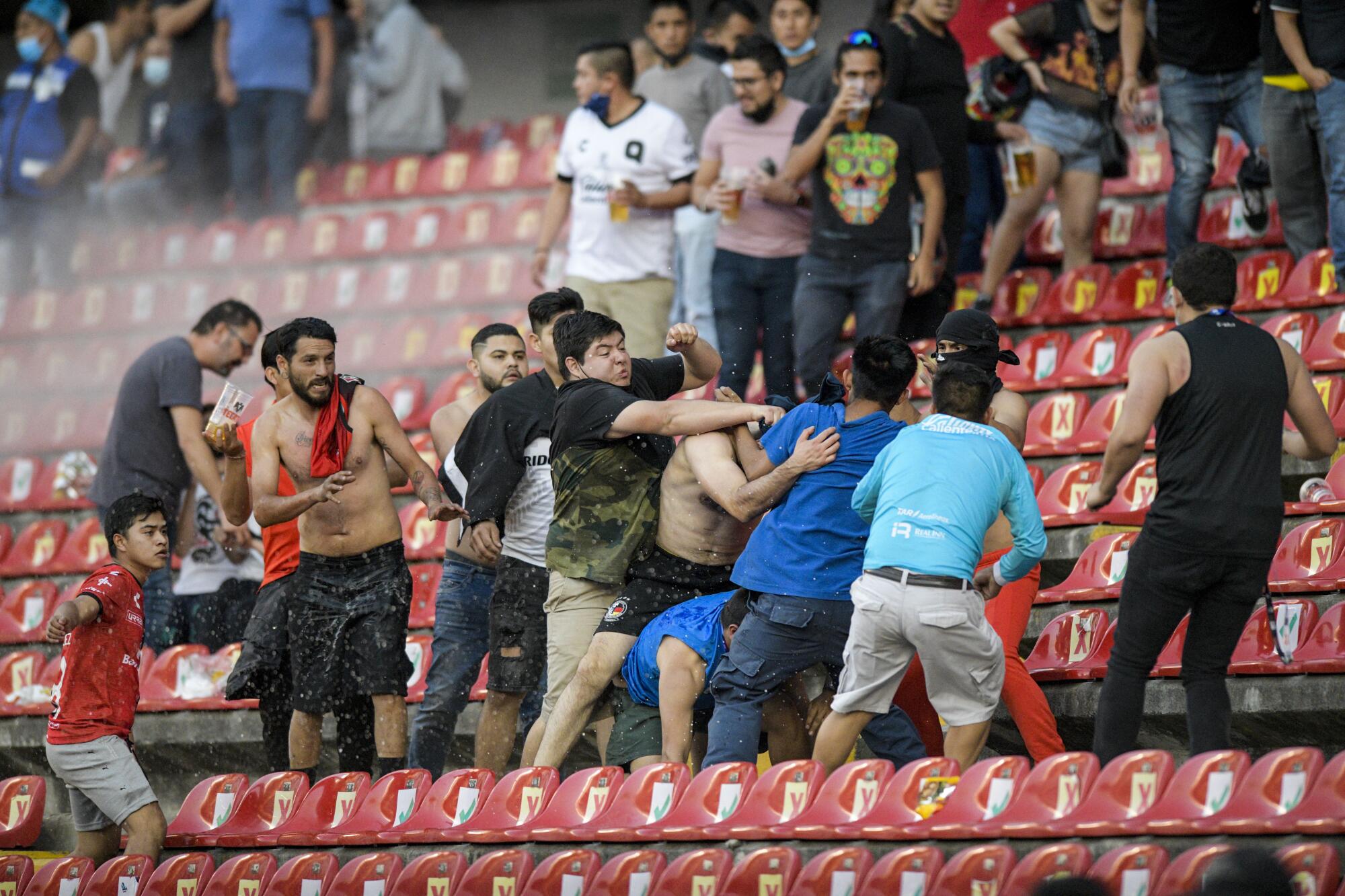
And while some in this colonial hub 135 miles northwest of Mexico City say the harsh penalties handed down by the Mexican league and the country’s soccer federation unfairly punish fans who had nothing to do with the riot, others see the moment as a transformational one that could change the sport — and Mexico — for the better.
“I think absolutely it will. Because it’s necessary,” a Gallos season-ticket-holder, who gave his name only as Alvaro, said as he visited friends at a quiet restaurant tucked along the warren of narrow streets that lead to the city’s historic central plaza.
Because many here believe the fan violence that has become a stain on Mexican soccer might be tied to criminal gangs or drug cartels, it’s best to remain anonymous when talking about it.
“In a country like this, the narcotrafficantes are behind everything,” nodded a woman sitting nearby, who also declined to give her full name. “There’s no evidence. But we know.”
Since 2013, at least one match a year has been disrupted by fights or clashes with police, the exception being 2020-2021, when attendance was restricted by COVID-19 protocols. One brawl ended in gunfire.
The Liga MX brawl between Atlas and Querétaro fans has left Mexico in mourning, triggering questions about transparency, security and accountability.
But the riot during Querétaro’s match with Atlas of Guadalajara, the reigning Mexican champion, stood out both for its savagery and the fact its horrific results were captured and shared on social media. Fans attacked one another with knives, chairs, belts, metal bars, even a corner flag pulled from the field. Some were left unconscious, their bloody bodies stripped naked and left lying on the cold concrete.
The violence seemed premeditated and choreographed, witnesses said, not the result of typical fan passion spinning out of control.
“What we saw was not a normal dispute between fans,” said Enrique Alfaro, the governor of Jalisco state, when asked about media reports that members of a local drug cartel might have been involved. “There was something that looked different.”
It was among the worst soccer riots in Mexican history, one that has led to 27 arrests, according to Guadalupe Murguía, the interior secretary for the state of Querétaro.
And Mikel Arriola, the politician-turned-president of Liga MX, and Yon de Luisa, president of the Mexican soccer federation, moved swiftly to address it, approving punishing sanctions that effected not only Querétaro, but the league’s other 17 teams as well.
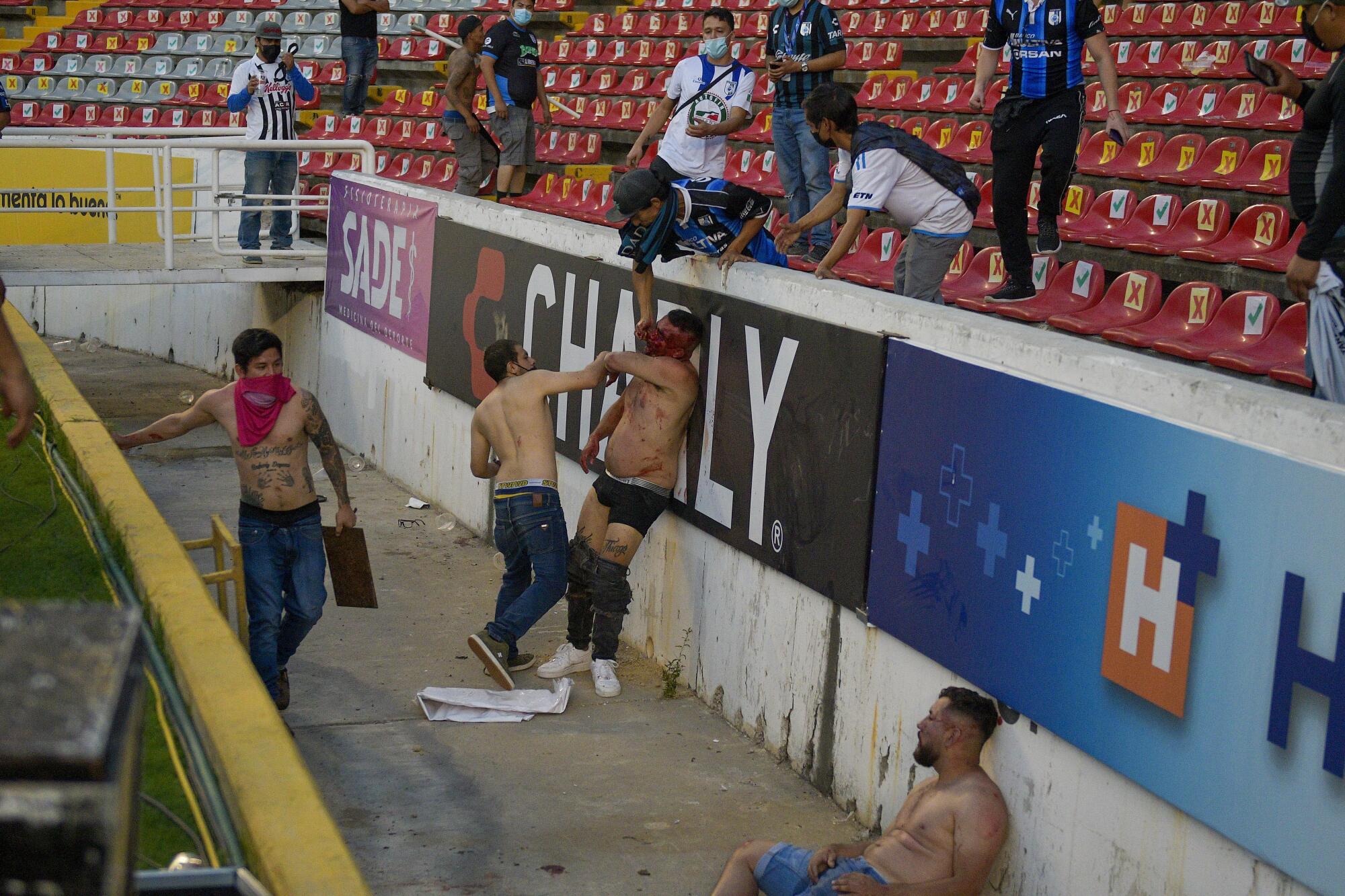
Querétaro must play all of its home games in empty stadiums for the next year, a ban on fans that extends to the club’s youth and women’s teams as well. The Gallos Blancos’ organized supporter group is banned from home games for three years and four team owners have been prohibited from any association with Mexican football for five years.
The club was also given back to Grupo Caliente, which runs the rival Liga MX team in Tijuana, with orders to sell ownership of the team by the end of the year.
Meanwhile the league’s other teams were ordered to implement mandatory credentialing for its organized fan groups, whose members will be limited to specific areas of each stadium where they will be surrounded by police. Security will be heightened around Liga MX under the direction of the league office.
During an appearance Thursday before Mexico’s Chamber of Deputies, the lower house of the country’s bicameral parliament, Arriola indicated he wasn’t done, saying he hopes to completely stamp out so-called barras bravas, fanatical and often violent supporter groups similar to those that have plagued European soccer.
“I don’t ever really think anything’s unfair,” said Paul Foster, a Texas billionaire who is part of the ownership group of Liga MX club FC Juárez. “There are consequences and actions and reactions. We have a responsibility as owners to make sure that our fans are safe and make sure nothing happens here.
“So I don’t really look at it as unfair.”
Fans attending an Atlas at FC Juárez match Friday, among the Liga MX games since a bloody brawl, welcomed enhanced security and calls for peace.
Liga MX is the most popular soccer league in North America, its televised games averaging twice as many viewers in the U.S. as the domestic MLS. It’s Mexico’s version of the NFL and NBA rolled into one.
Yet in Querétaro, a city of about a million that has suddenly been left without a team to cheer for in person, people have taken a nuanced view of the sanctions.
“It’s very complicated,” said Paulina Hernández, a journalist who writes about soccer. “There are a lot of people who go to the stadium not to cause problems, just to watch the game. But in a situation like this, you have to do something.”
Querétaro is among Mexico’s quietest and safest urban centers, one in which a small-town colonial charm mixes with a modern urban sprawl of industrial and economic activity. That makes the violence that erupted in the city’s soccer stadium so shocking.
“These terrible events outrage us, embarrass us and we deeply regret them and commit us as an industry to work so that we never experience something similar in any stadium,” De Luisa said.
Mexico’s Liga MX announces significant sanctions in the aftermath of the bloody riot that occurred at the Atlas versus Querétaro match Saturday.
He and Arriola see themselves as reformers tasked with modernizing and cleaning up Mexican soccer and converting that kind of talk into meaningful action after years of inertia. In a country that has grown weary of violence, the riot in Querétaro has given them both the opportunity and the widespread public support to do just that.
More than 33,000 people were murdered in Mexico last year, according to a government tally. That’s more than a third higher that the homicide count in the U.S., which has 200 million more people. And femicide, the murder of women in gender-based violence, has more than doubled in Mexico in the last six years.
Part of the national dialogue that has resulted from Querétaro riot has put soccer violence within those broader societal trends. Reducing violence in the stadium and removing the influence of drug cartels, whether real or imagined, that the argument goes, could have positive impacts elsewhere.
“Directly or indirectly, everyone was involved in the violence. And we all have to pay at least part of the price,” said the fan who identified himself as Alvaro.
“Everyone agrees this crossed the line. Now we have to change football.”
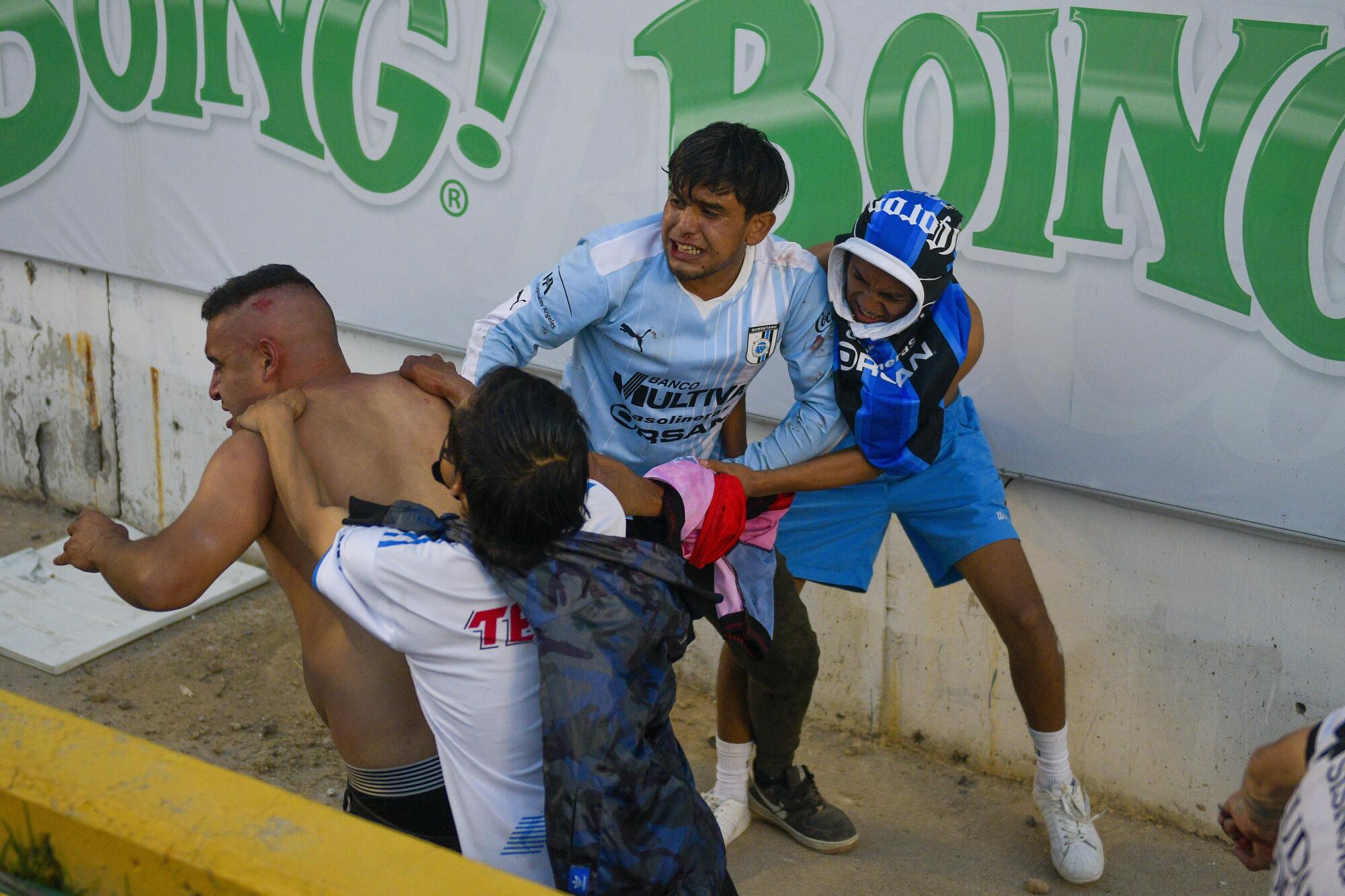
It has happened before.
Colombia’s rapid rise in world soccer in the 1980s and ‘90s was largely funded by the cartels, which expected to profit from their largesse by gambling heavily on the team. As a result, the national team that went to the U.S. for the 1994 World Cup was under almost unbearable pressure.
When an own goal by Andrés Escobar led to a loss and the team’s elimination from the tournament, the popular defender paid for that mistake with his life, a murder that was later pinned on a cartel leader.
The country and its fans learned the obvious lesson and drug traffickers were driven out of the sport while banners with Escobar’s likeness were unfurled at Colombian games for years after his death.
“Directly or indirectly, everyone was involved in the violence. And we all have to pay at least part of the price. Everyone agrees this crossed the line. Now we have to change football.”
— Alvaro, an Querétaro season ticket holder who declined to share his full name out of fear
In Mexico, meanwhile, the Querétaro riot and its aftermath has created a space for wider discussions on other topics as well. When the city’s women’s team, which had no role in the violence, was also ordered to play its games in empty stadiums for a year, Mariana Covarrubias, a writer, activist and college teacher, launched a campaign under the hashtag #equalpaynotequalblame to move Mexico’s fledgling women’s league out from beneath the umbrella it shares with the men’s Liga MX.
“We realized that the problem was deeper than the sanctions. The structure of the clubs that means that although there are two leagues, the women’s is tied to the men’s,” she said.
Covarrubias, who didn’t consider herself a soccer fan two weeks ago, now sees the sport as a vehicle for the changes she believes are overdue.
“We were not that interested because we were not interested in football,” she added. “But now we’re interested.”
Back at La Corregidora, which sits on a bluff overlooking the southern edge of the city, a pair of joggers padded quietly alongside the chain-link fence lining the parking lots Thursday night as a bored watchman sat on a box outside his guard shack, a pale blue facemask pulled below his nose.
The only sound outside the stadium came from crickets and a warm wind while 120 miles away Querétaro’s “home game,” moved to Morelia because of the Liga MX sanctions, was ending in 2-1 win.
Fittingly, two of the three goals were scored on penalties.

